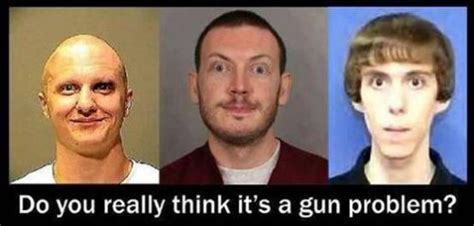 Most
Mass Shooters, Including Those With Mental Illness, Obtained Their
Firearms After Passing A Background Check. Expanding Background
Checks Won’t Stop Them.
Most
Mass Shooters, Including Those With Mental Illness, Obtained Their
Firearms After Passing A Background Check. Expanding Background
Checks Won’t Stop Them.There are realities about gun control and the mentally ill that gun control advocates ignore.
The first reality is that the best that any gun control law can do is force buyers into the black market. While this is a worthy goal, if laws against gun trafficking are not enforced, prohibited persons — including the severely mentally ill — will still be able to purchase firearms.
The second reality is that gun laws do not exist in isolation. They are dependent upon the enforcement of other laws and the proper functioning of our legal and mental health systems. This post will focus upon the issue of mental health treatment and how it impacts the background check system.
 As
this is written we are just learning some details about the King
Soopers shooting in Boulder Colorado. That said, I could have
predicted the news before it was reported: The alleged mass murderer
had a long history of mental illness (possibly undiagnosed) and had
multiple contacts with police. I will predict now that we
will soon learn that this man passed a background check. This is
easy to predict because we have seen it happen over and over
again. Expanding background checks to private sales will not help when the severely mentally ill can pass them!
As
this is written we are just learning some details about the King
Soopers shooting in Boulder Colorado. That said, I could have
predicted the news before it was reported: The alleged mass murderer
had a long history of mental illness (possibly undiagnosed) and had
multiple contacts with police. I will predict now that we
will soon learn that this man passed a background check. This is
easy to predict because we have seen it happen over and over
again. Expanding background checks to private sales will not help when the severely mentally ill can pass them!
How can this possibly happen? Well, as a former paramedic with 10 years EMS experience I know the answer: The mental health system - not gun laws - failed. This happens at two levels:
 The first level is field mental health.
In most states, police are responsible for sending in people who are
“acting out” and appear to be unable to care for themselves, or are a
danger to themselves or others, to mental health facilities for
emergency evaluation (in CA this is done via a 5150 hold). Cops
struggle with this responsibility, because they are not experts on
mental heath. I know how this works because I transported
literally thousands of such people on holds. Yet
in the wake of mass shootings we learn that police were called because
of their bizarre or threatening behavior and the law enforcement
officers did not commit them for evaluation. In the case
of the Giffords shooter, this happened over 20 times — yet he was not
sent in for evaluation even once. Every one of these incidents was a missed opportunity.
The first level is field mental health.
In most states, police are responsible for sending in people who are
“acting out” and appear to be unable to care for themselves, or are a
danger to themselves or others, to mental health facilities for
emergency evaluation (in CA this is done via a 5150 hold). Cops
struggle with this responsibility, because they are not experts on
mental heath. I know how this works because I transported
literally thousands of such people on holds. Yet
in the wake of mass shootings we learn that police were called because
of their bizarre or threatening behavior and the law enforcement
officers did not commit them for evaluation. In the case
of the Giffords shooter, this happened over 20 times — yet he was not
sent in for evaluation even once. Every one of these incidents was a missed opportunity.
 The second level is our actual mental health care system.
When these severely and potentially dangerously mentally ill persons
are sent in for evaluation against their will, they have to actually
get some help and be reported to the background check system. Sadly,
this simply does not happen the vast majority of the time due to lack
of resources (see graphic at left). When I transported people for
evaluation, the most common outcome was that the were released within
hours with a bottle of pills (often dangerous in overdose) and maybe a
follow-up appointment. It was not uncommon for us to transport
the same person multiple times in a single week or even shift.
They frequently overdosed on the very pills they were given on their
first trip to the mental health emergency room. If we are going to actually reduce these incidents of mass murder by the severely mentally ill, this has to change.
The second level is our actual mental health care system.
When these severely and potentially dangerously mentally ill persons
are sent in for evaluation against their will, they have to actually
get some help and be reported to the background check system. Sadly,
this simply does not happen the vast majority of the time due to lack
of resources (see graphic at left). When I transported people for
evaluation, the most common outcome was that the were released within
hours with a bottle of pills (often dangerous in overdose) and maybe a
follow-up appointment. It was not uncommon for us to transport
the same person multiple times in a single week or even shift.
They frequently overdosed on the very pills they were given on their
first trip to the mental health emergency room. If we are going to actually reduce these incidents of mass murder by the severely mentally ill, this has to change.
Currently, in order for a person to be denied their firearms rights, they must be committed against their will for at least two weeks. This time was chosen for a reason: In most states this is the point at which the doctors must go to a court and get an order to continue holding the person against their will. In court the person can present a defense, and to deprive someone of their rights without such due process violates the 5th Amendment. Of course getting in-patient treatment might actually help the person and reduce the danger to the public if and when they are released.

The Answer Is Not To Deny Everyone Gun Rights
It Is To Identify And Help The Dengerous Mentally Ill
This is what, in my opinion, we can change that will actually help:
1) Make sure that every state has an emergency commitment law on the books
2) Send mental health professionals into the field to evaluate people that are acting out and may be dangerous. This should take the form of special teams of trained police officers and a mental health professional. Most cops would welcome this change.
3) Fund mental health care so people get the help they need, or are cared for in secure facilities if they remain dangerous.
4) Aggressively enforce the laws against firearms trafficking and straw purchasing.
5) Finally, I would support changing laws so that mental health professionals could petition the courts to find that their patient is too mentally ill to retain their firearms rights. This would have to be done with respect for the patient’s 5th Amendment due process rights. There would also have to be a process in which the patient could petition the courts for restoration of their gun rights — such a firearms disability cannot be permanent and irrevocable.
Do these things, and we may be able to reduce (not eliminate) the number of mass shootings by the dangerously mentally ill.
Rev. R. Vincent Warde
3-23-2021
The first reality is that the best that any gun control law can do is force buyers into the black market. While this is a worthy goal, if laws against gun trafficking are not enforced, prohibited persons — including the severely mentally ill — will still be able to purchase firearms.
The second reality is that gun laws do not exist in isolation. They are dependent upon the enforcement of other laws and the proper functioning of our legal and mental health systems. This post will focus upon the issue of mental health treatment and how it impacts the background check system.
 As
this is written we are just learning some details about the King
Soopers shooting in Boulder Colorado. That said, I could have
predicted the news before it was reported: The alleged mass murderer
had a long history of mental illness (possibly undiagnosed) and had
multiple contacts with police. I will predict now that we
will soon learn that this man passed a background check. This is
easy to predict because we have seen it happen over and over
again. Expanding background checks to private sales will not help when the severely mentally ill can pass them!
As
this is written we are just learning some details about the King
Soopers shooting in Boulder Colorado. That said, I could have
predicted the news before it was reported: The alleged mass murderer
had a long history of mental illness (possibly undiagnosed) and had
multiple contacts with police. I will predict now that we
will soon learn that this man passed a background check. This is
easy to predict because we have seen it happen over and over
again. Expanding background checks to private sales will not help when the severely mentally ill can pass them!How can this possibly happen? Well, as a former paramedic with 10 years EMS experience I know the answer: The mental health system - not gun laws - failed. This happens at two levels:
 The first level is field mental health.
In most states, police are responsible for sending in people who are
“acting out” and appear to be unable to care for themselves, or are a
danger to themselves or others, to mental health facilities for
emergency evaluation (in CA this is done via a 5150 hold). Cops
struggle with this responsibility, because they are not experts on
mental heath. I know how this works because I transported
literally thousands of such people on holds. Yet
in the wake of mass shootings we learn that police were called because
of their bizarre or threatening behavior and the law enforcement
officers did not commit them for evaluation. In the case
of the Giffords shooter, this happened over 20 times — yet he was not
sent in for evaluation even once. Every one of these incidents was a missed opportunity.
The first level is field mental health.
In most states, police are responsible for sending in people who are
“acting out” and appear to be unable to care for themselves, or are a
danger to themselves or others, to mental health facilities for
emergency evaluation (in CA this is done via a 5150 hold). Cops
struggle with this responsibility, because they are not experts on
mental heath. I know how this works because I transported
literally thousands of such people on holds. Yet
in the wake of mass shootings we learn that police were called because
of their bizarre or threatening behavior and the law enforcement
officers did not commit them for evaluation. In the case
of the Giffords shooter, this happened over 20 times — yet he was not
sent in for evaluation even once. Every one of these incidents was a missed opportunity. The second level is our actual mental health care system.
When these severely and potentially dangerously mentally ill persons
are sent in for evaluation against their will, they have to actually
get some help and be reported to the background check system. Sadly,
this simply does not happen the vast majority of the time due to lack
of resources (see graphic at left). When I transported people for
evaluation, the most common outcome was that the were released within
hours with a bottle of pills (often dangerous in overdose) and maybe a
follow-up appointment. It was not uncommon for us to transport
the same person multiple times in a single week or even shift.
They frequently overdosed on the very pills they were given on their
first trip to the mental health emergency room. If we are going to actually reduce these incidents of mass murder by the severely mentally ill, this has to change.
The second level is our actual mental health care system.
When these severely and potentially dangerously mentally ill persons
are sent in for evaluation against their will, they have to actually
get some help and be reported to the background check system. Sadly,
this simply does not happen the vast majority of the time due to lack
of resources (see graphic at left). When I transported people for
evaluation, the most common outcome was that the were released within
hours with a bottle of pills (often dangerous in overdose) and maybe a
follow-up appointment. It was not uncommon for us to transport
the same person multiple times in a single week or even shift.
They frequently overdosed on the very pills they were given on their
first trip to the mental health emergency room. If we are going to actually reduce these incidents of mass murder by the severely mentally ill, this has to change.Currently, in order for a person to be denied their firearms rights, they must be committed against their will for at least two weeks. This time was chosen for a reason: In most states this is the point at which the doctors must go to a court and get an order to continue holding the person against their will. In court the person can present a defense, and to deprive someone of their rights without such due process violates the 5th Amendment. Of course getting in-patient treatment might actually help the person and reduce the danger to the public if and when they are released.

The Answer Is Not To Deny Everyone Gun Rights
It Is To Identify And Help The Dengerous Mentally Ill
This is what, in my opinion, we can change that will actually help:
1) Make sure that every state has an emergency commitment law on the books
2) Send mental health professionals into the field to evaluate people that are acting out and may be dangerous. This should take the form of special teams of trained police officers and a mental health professional. Most cops would welcome this change.
3) Fund mental health care so people get the help they need, or are cared for in secure facilities if they remain dangerous.
4) Aggressively enforce the laws against firearms trafficking and straw purchasing.
5) Finally, I would support changing laws so that mental health professionals could petition the courts to find that their patient is too mentally ill to retain their firearms rights. This would have to be done with respect for the patient’s 5th Amendment due process rights. There would also have to be a process in which the patient could petition the courts for restoration of their gun rights — such a firearms disability cannot be permanent and irrevocable.
Do these things, and we may be able to reduce (not eliminate) the number of mass shootings by the dangerously mentally ill.
Rev. R. Vincent Warde
3-23-2021









